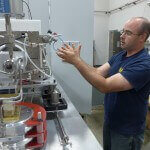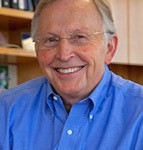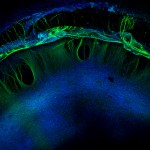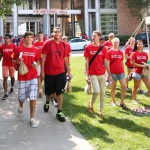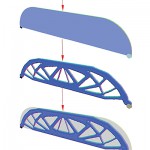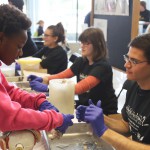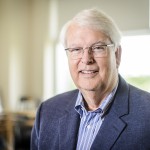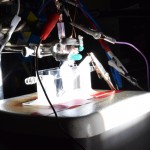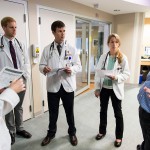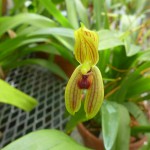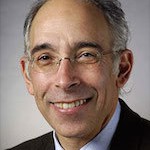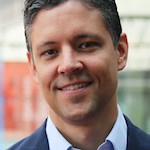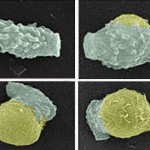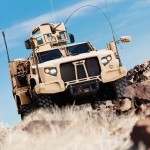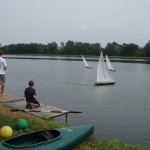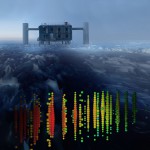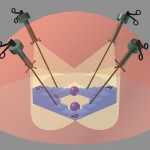Category Science & Technology
Heavy-duty neutron accelerators paint promising future for UW–Madison spinoff
A Madison manufacturer of the world's most powerful commercial neutron generators is awaiting final regulatory approval for its first sale outside the research market. The device will be used to calibrate safety detectors at nuclear reactors in the United Kingdom.
WARF board speaks out on proposed fetal tissue ban
The Board of Trustees of the Wisconsin Alumni Research Foundation (WARF) today announced unanimous opposition to a state legislative proposal to ban the use of fetal tissue in scientific research.
Stem cell-derived ‘organoids’ help predict neural toxicity
A new system developed by scientists at the Morgridge Institute for Research and the University of Wisconsin–Madison may provide a faster, cheaper and more biologically relevant way to screen drugs and chemicals that could harm the developing brain.
Souped-up software reduces guesswork, tedium in computer-aided engineering
A team of University of Wisconsin–Madison engineers recently released a new computer-aided engineering software program, and its users are already calling it a "gift from heaven."
Weather-tech jobs remain in Madison even after company is sold
His demo tape as a TV weatherman was adjudged "pretty awful," yet it got University of Wisconsin–Madison grad Terry Kelly started "doing the weather" on WKOW Channel 27 in Madison in 1974. To improve on the paper drawings he was using to show storms and fronts, Kelly started Weather Central and built it into America's premier computer weather graphics and weather modeling business.
Discovery of a highly efficient catalyst eases way to hydrogen economy
Hydrogen could be the ideal fuel: Whether used to make electricity in a fuel cell or burned to make heat, the only byproduct is water; there is no climate-altering carbon dioxide.
The science of stereotyping: Challenging the validity of ‘gaydar’
"Gaydar" - the purported ability to infer whether people are gay or straight based on their appearance - seemed to get a scientific boost from a 2008 study that concluded people could accurately guess someone's sexual orientation based on photographs of their faces.
Josh Medow: Critical care for the brain
At Joshua Medow's first job, in the Neurocritical Intensive Care Unit at UW Hospital and Clinics, he saves lives. His patients have endured strokes, car accidents and shootings.
Family tree for orchids explains their astonishing variability
Orchids, a fantastically complicated and diverse group of flowering plants, have long blended the exotic with the beautiful. Most species live on trees, often in remote, tropical mountains. Their flowers can be strange - one even flowers underground, and many species deceive their pollinators into thinking they are good to eat.
Morgridge Institute selects Pagliarini to lead campus metabolism initiative
Dave Pagliarini, a University of Wisconsin–Madison associate professor whose departmental home put metabolism research on the map worldwide, will help define the future of Wisconsin metabolism science as a lead investigator at the Morgridge Institute for Research.
An ounce of prevention: Research advances on ‘scourge’ of transplant wards
The fungus Cryptococcus causes meningitis, a brain disease that kills about 1 million people each year - mainly those with impaired immune systems due to AIDS, cancer treatment or an organ transplant. It's difficult to treat because fungi are genetically quite similar to humans, so compounds that affect fungi tend to have toxic side effects for patients.
UW-Madison engineers contribute expertise to Oshkosh Corporation
When mechanical engineering Professor Dan Negrut took his first ride in Oshkosh Corporation’s new, highly mobile armored truck in July, he marveled at the vehicle’s capabilities.
Boundless Together: The research behind the commercial
A new commercial for UW–Madison will premier during the season-opening Badger football game on Aug. 5. Learn more about the cutting-edge research highlighted in the spot.
Wireless microcamera clusters broaden laparoscopic imaging
A revolutionary integrated imaging system under development at the University of Wisconsin–Madison could significantly advance laparoscopy, a minimally invasive surgical procedure that, over the last half century, has seen only incremental improvements in imaging.

